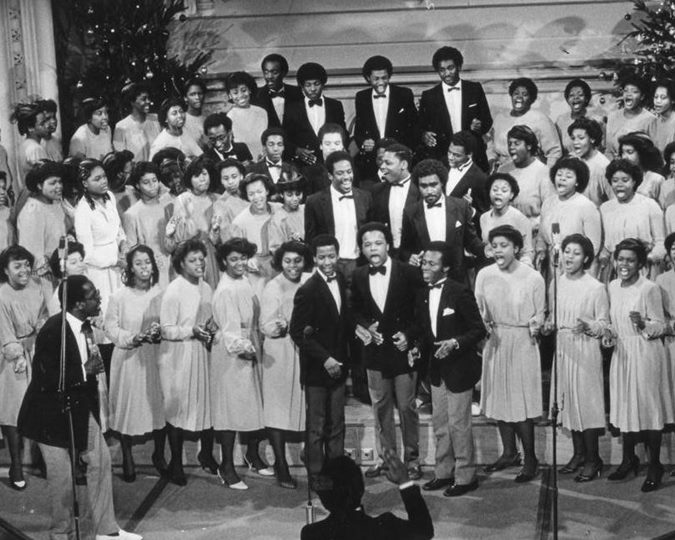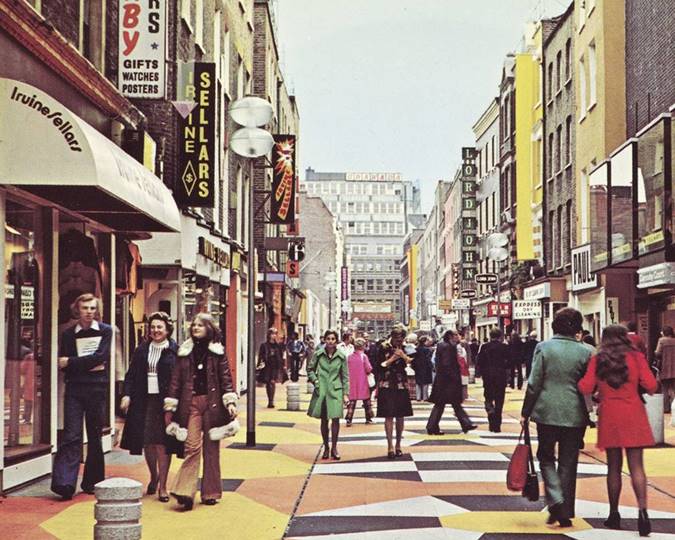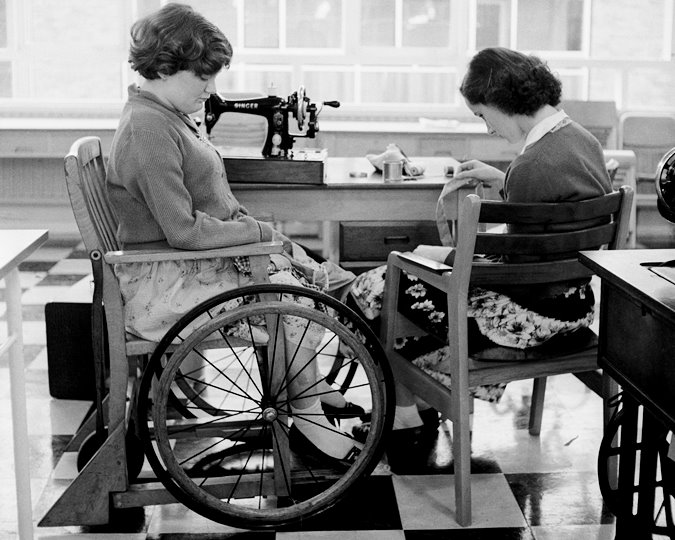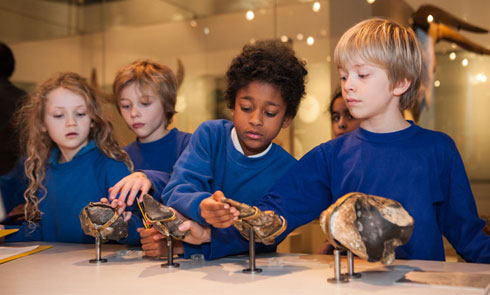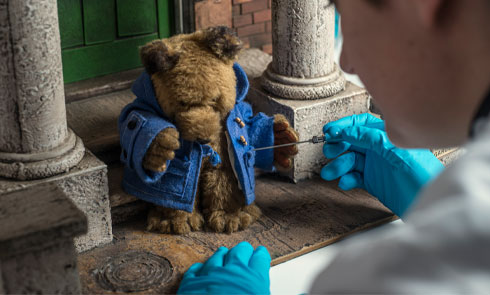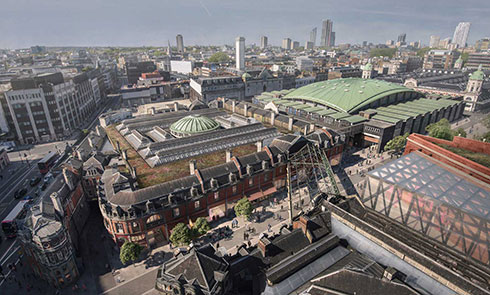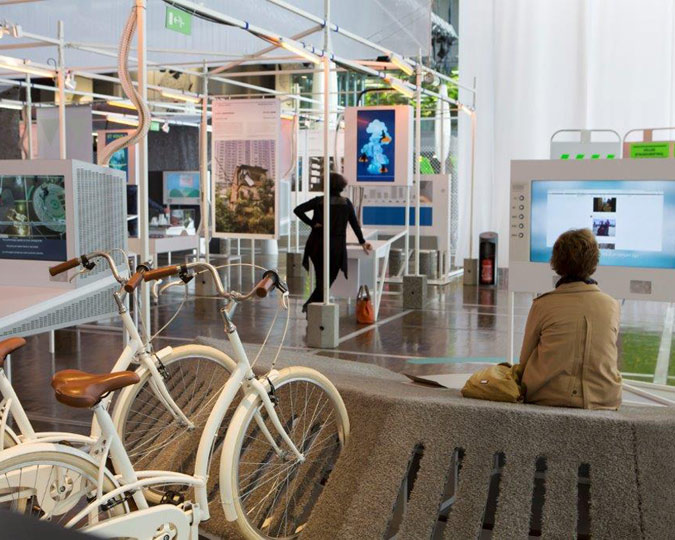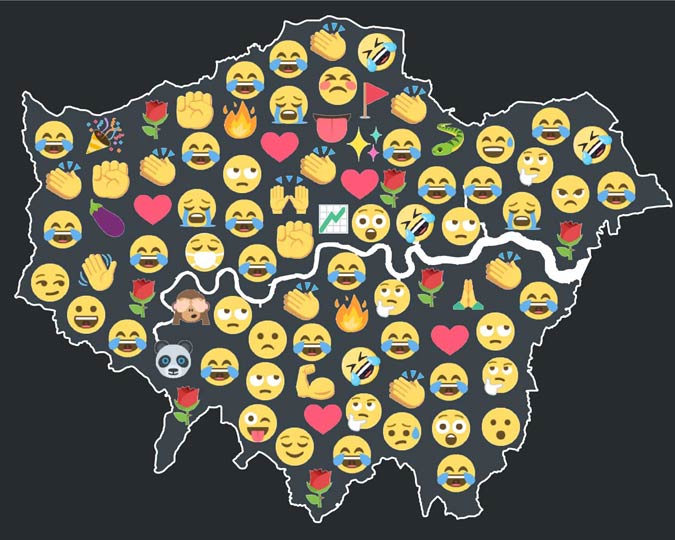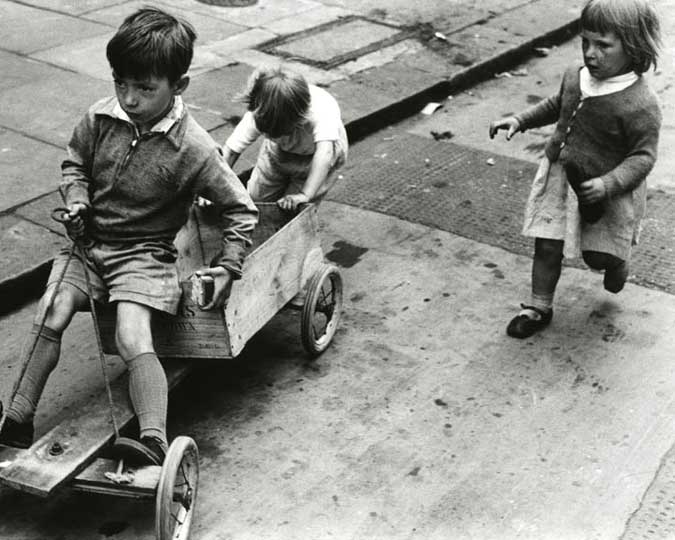The City is Ours, a 2017 exhibition at the Museum of London, asked how we survive and thrive on an urban planet. We partnered with 25 projects across London who are working to make the city a better place. Learn more below about how you can help to change the city.
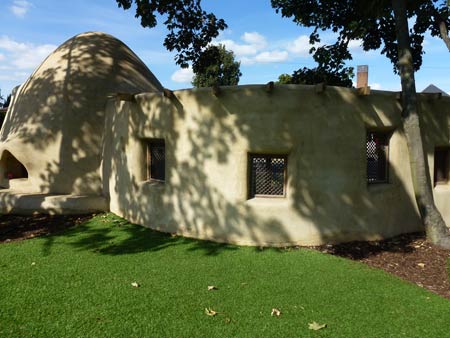
Small Earth, enterprise
Hounslow, started 2009
Hounslow Heath Infant and Nursery School is directly under the flight path of Heathrow Airport's southern runway. Outside play for pupils is interrupted every two minutes as airplanes pass a few hundred feet over their heads. In October 2009 Small Earth, the company behind the construction of the Adobe Village, was commissioned to build an earth dome in the school’s playground area to create a safe environment for the children to play.
Small Earth describes the earth domes as ‘environmentally friendly, ecologically sound, versatile, affordable, flood, fire and earthquake resistant with sound and thermal insulation’. Sound tests inside the earth dome have shown noise reduction of over 17 decibels, decreasing considerably the noise pollution for pupils at the school. Heathrow are now providing these buildings to other schools through their Community Noise Insulation Scheme.
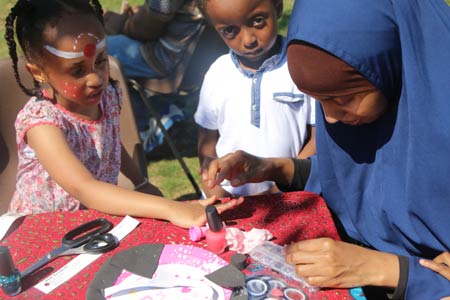
CARAS, registered charity
Tooting, since 2008
CARAS works with refugees and asylum seekers in London by offering a range of services from advice and mentoring to English lessons with a particular focus on the practicalities of daily life. Established in Tooting in 2008, their aim is to help refugees and asylum seekers to access services and opportunities and ‘to build supportive social networks and feel welcomed in their new communities’.
Their services are explicitly ‘designed to empower people’ – giving them the information, tools and confidence they need to overcome the challenges they face. They work in particular with women and unaccompanied asylum-seeking children who are likely to have the most difficulty in accessing services.
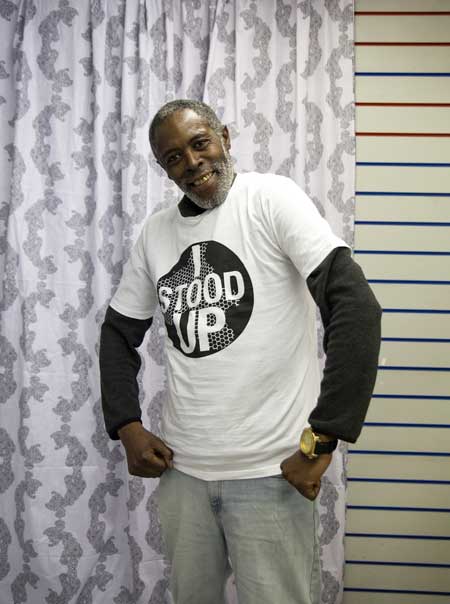
London College of Fashion, University of the Arts
Across London, since 2008
The Centre for Sustainable Fashion is a Research Centre based at the London College of Fashion, University of the Arts. Through a wide range of activities, the London College of Fashion encourages dialogue between staff, students and the wider community to help develop an understanding of how fashion can be used as a catalyst to ‘drive change, build a sustainable future and improve the way we live’. The aim of their initiative ‘I Stood Up’, for example, is to enable people to express their concerns about environmental and social problems, from water shortage and pollution to political apathy. By creating their own t-shirts, Londoners are able to voice creatively what they are standing up for.
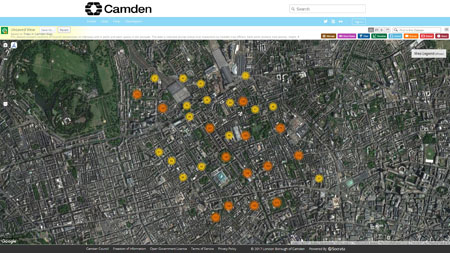
London Borough of Camden
Camden, since 2015
Open Data Camden is an initiative launched in 2015 by Camden Borough Council that shares local government data with the public. Over 300 datasets containing current information – from parking bays and planning applications to housing stock and road accidents in Camden – are shared on the council’s website under the transparency code for local governments in London. This code sets out the minimum requirements for local authorities to make open data freely available to the public for re-use.
The intention is to help residents stay informed about the council’s decisions, for businesses and developers to re-use the data to create apps like a parking bays location finder map, and for the council itself to reduce time spent gathering data across departments. The website has had 1.7m views since March 2015.
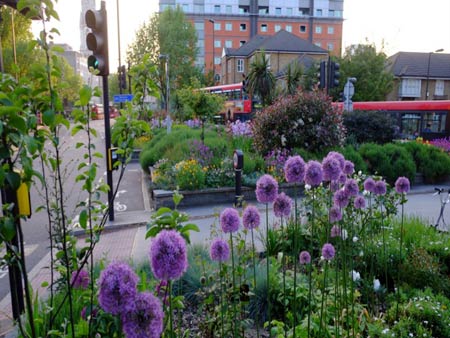
Richard Reynolds, individual
Elephant and Castle, since 2004
Guerrilla gardening is the act of gardening on land that the gardeners do not have legal rights to cultivate, such as abandoned sites or neglected spaces. In 2004, Richard Reynolds began a blog to record his solo guerrilla gardening activities outside Perronet House, a neglected council block in Elephant and Castle. Since then he has planted more than 20 spaces in his local area, and increasing numbers of people have been inspired to join the guerrilla gardening movement and transform London’s abandoned spaces.

Goldsmiths, University of London
Deptford, since 2013
The Citizen Sense project is looking at how citizens are engaging with environmental sensing technologies and what the potential of this might be. It has developed a new pollution-sensing technology called the ‘Dustbox’ which is being used to test air quality in Deptford and surrounding neighbourhoods.
Residents monitor the area with the Dustbox and its sensors collect environmental data which they can then download and analyse on Citizen Sense’s Airsift toolkit. The project helps people to better understand the amount of pollution in their local environment while the collected data has the potential to help improve the community’s infrastructures.
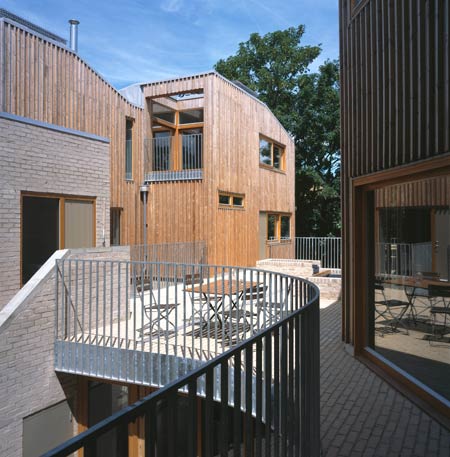
Henly Halebrown architects, enterprise
1-6 Copper Lane, Stoke Newington, since 2014
Copper Lane is London's first co-housing project. Architects Henley Halebrown designed 1-6 Copper Lane in Stoke Newington for a group of residents who joined forces to create a community of six individual houses with communal areas. The residents formed a limited company, bought a disused 1,000-square-metre nursery, and appointed the architects to create six homes and to maximise the use of shared spaces.
Both the architects and the residents followed a consensus-led decision-making procedure in all aspects of the development. Co-housing is a way for individuals to own a home while benefitting from additional facilities made more affordable through communal investment and use, such as laundries, gardens or play rooms.
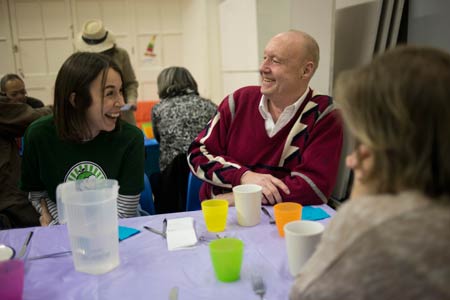
Foodcycle, national charity
Bloomsbury, Hackney, Islington, Lewisham, LSE, Marylebone and Peckham, since 2009
FoodCycle is a national charity that ‘combines volunteers, surplus food and spare kitchen spaces to create nutritious meals for people at risk of food poverty and loneliness’. They run over 30 projects across the UK – including 10 in London – based on the simple idea that food waste and food poverty should not coexist. The charity reports that every year, 20 million tons of food is put to waste in the UK. At least 400,000 tons of this waste is edible food disposed of by retailers because it has lost its commercial value. FoodCycle serve over 950 community meals a week, using over a ton of reclaimed food.
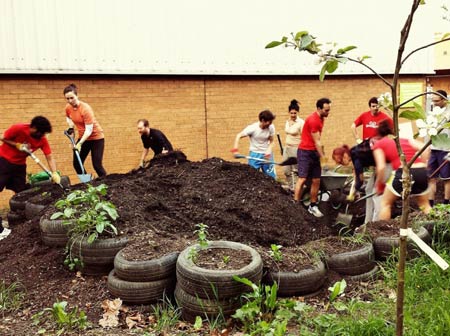
GoodGym, community initiative
Hackney, since 2009
GoodGym is a community of runners who combine getting fit with providing help to older people in London.
One million people aged 65 and over admit to always or often feeling lonely, and 17% of those living alone see family and friends less than once a week, according to Age UK. GoodGym helps to improve the quality of life of older people. GoodGym runners combine their runs with undertaking physical tasks for community organisations and supporting isolated older people through social visits and one-off tasks that they can't do on their own.
By working with the NHS, charities and local community centres, including The Sundial Centre in Bethnal Green and Toynbee Hall, GoodGym matches runners with an individual coach – a housebound elderly person who would like a regular visitor. They are encouraged to take a newspaper or a modest gift to the value of £1. There are also monthly group runs around east London, performing useful activities along the way. So far GoodGym members have distributed flyers for a local hospice, tidied up community gardens and hauled compost on to a school roof.
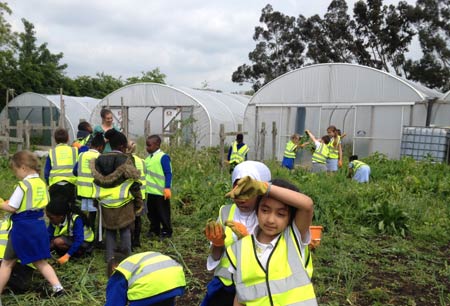
Growing Communities, social enterprise
Dagenham, Hackney and Barking, since 1996
Growing Communities aims to create a more sustainable and resilient food system, based on local growing and the ‘collective buying power’ of communities. In Hackney, they run an organic fruit and vegetable scheme while their Growing Communities Farmers' Market aims to provide small sustainable farmers with a fair and stable market. Their ‘Grown in Dagenham’ programme – funded by the Big Lottery – trains local residents, including children, in organic food growing and preparation with the aim both of improving individual wellbeing and giving residents access to fresh local produce.
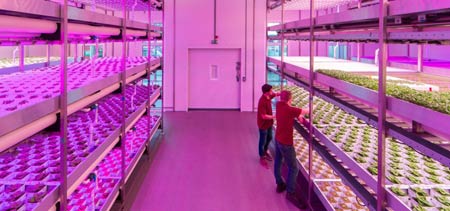
GrowUp Urban Farms, enterprise
Beckton, 2013
GrowUp runs the first hydroponic and aquaponics urban farm in London. GrowUp produce sustainable fish, salads and herbs in London using a combination of aquaponics and vertical growing technologies. Based in a Beckton warehouse which has been converted into an urban farm, they describe their growing cycle as follows: ‘Our growing technique consists of us feeding the fish, in turn the waste created by the fish is pumped into the grow room to then feed the plants, which are grown on recycled carpet matting, and as we’re indoors we can grow all year round’. They deliver their produce around London using an electric van.
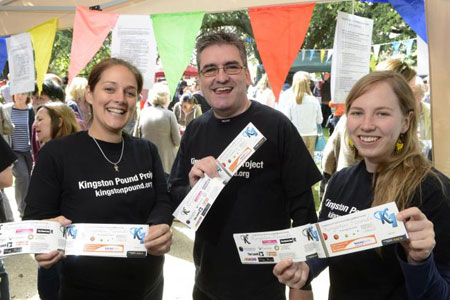
Kingston Pound, community interest company
Kingston-upon-Thames, since 2014
The Kingston Pound is a new digital complementary currency valid in Kingston-upon-Thames. Conceived in 2013, the Kingston Pound is designed to support the local economy by encouraging people to spend their money in independent local shops and local businesses. It currently exists electronically using banking software, with plans in place to roll out an analogue currency. In January 2017 the project announced that, three years since its launch, the Kingston Pound has added value to the local economy with each £1 converted equaling a value of K£1.30 for the area.
The project works with local community groups through its charity partner Love Kingston to ensure the value to the area is not just financial. As well as encouraging community members to invest in their local area, it invites them to ‘join the conversation about the efficient use of its resources and money’ and believes that ‘using Kingston Pounds is helping to turn money transactions into social interactions and so in that way the Kingston Pound is more than a method of payment’.
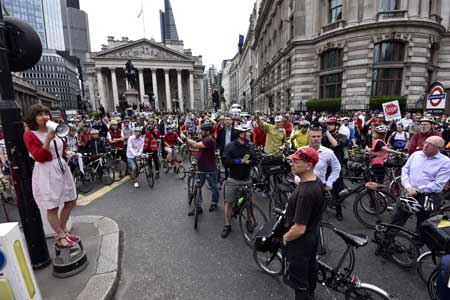
London Cycling Campaign, charity
Southwark, since 1978
The London Cycling Campaign’s vision is to ‘transform the city into a healthier, cleaner and happier place to live, where cycling is a choice for any Londoner who wants to ride the streets conveniently and without fear’. To achieve this they ‘lobby decision-makers at all levels, presenting them with evidence-based arguments for encouraging bicycle use before motorised transport’. For example, they recently campaigned to secure traffic restrictions and safety improvements for pedestrians and cyclists at Bank junction. All motor vehicles, apart from buses, will now not be allowed to travel through the junction from 7am till 7pm, Monday to Friday, improving safety for the pedestrians and cyclists who use it every day.
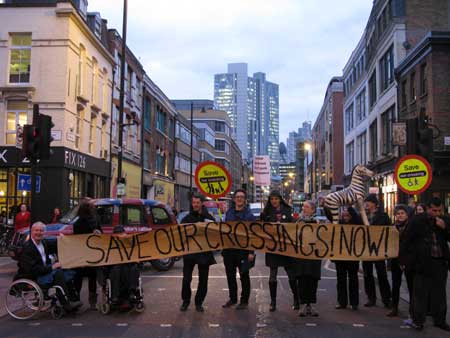
Living Streets, charity
Whitechapel, since 2001
Living Streets ‘want to create a walking nation, free from congested roads and pollution, reducing the risk of social isolation in London’. Their ambition is ‘to get people of all generations to enjoy the benefits of walking and to ensure all the streets in the city are fit for walking’. One of their current campaigns is calling for Oxford Street to be made vehicle-free. They are also running a series of initiatives and challenges to encourage more children to walk to school – from resources for teachers and parents to monthly badges, designed by pupils, for children who walk to school at least once a week – with the aim of creating ‘a new walking generation’.
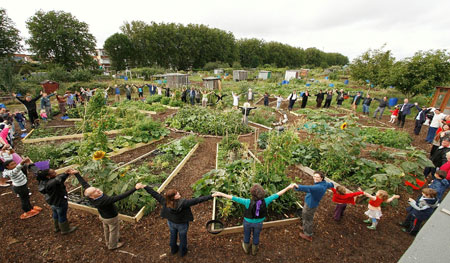
Living Under One Sun, community organisation
Haringey, since 2007
Living Under One Sun, which aims to ‘create more connected neighbourhoods’, has supported more than 50 community-inspired projects, from an allotment in the Lee Valley to a dance academy in Tottenham. Living Under One Sun (LUOS) is a not-for-profit organisation in Haringey which aims to bring people together in order to ‘create healthier, happier and more connected neighbourhoods’. The organisation started 11 years ago when a community development co-ordinator working for Haringey council met a group of Kosovan women who were feeling isolated in their local area and organised a ‘breakfast get-together’. Today LUOS run a community allotment, food growing projects, a sewing club, a walking group and a bike club, over 55 meet ups and a dance academy.
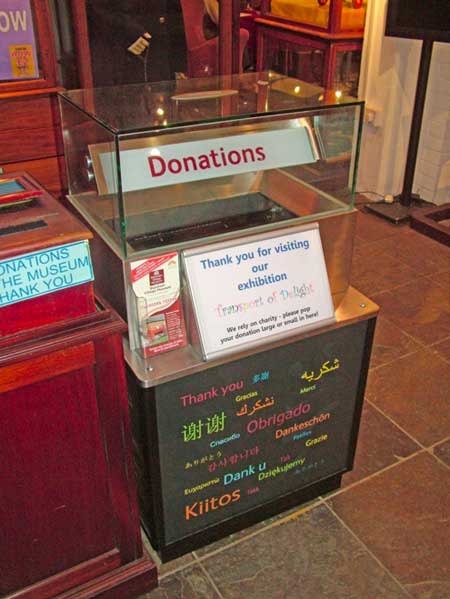
Museum Freecycle, community group
Kennington, since 2014
Museum Freecycle is hosted by the Freecycle network and enables unwanted objects or equipment to be recycled between museums. Museum Freecycle is the first industry-wide Freecycle group and is run voluntarily with no budget. Since its inception, the initiative has reduced the environmental impact of the museum sector and given a second lease of life to hundreds of thousands of pounds worth of museum equipment.
The group is ‘free to join, free to use and designed for the free exchange of items between museums’. The group, which has over 600 museums as members, uses the Freecycle network’s technology and is operated at no cost to the museum sector. To take just one example, last year, the volunteer-run Bloxham Village Museum replaced their homemade donations jam jar with a purpose-built donation box from the Natural History Museum, which they sourced through Freecycle.
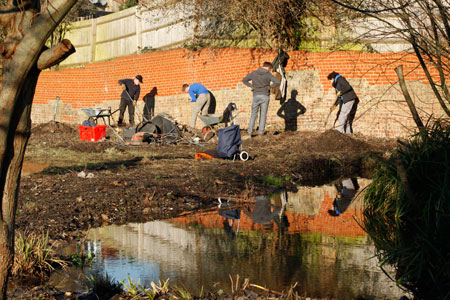
Hanwell and Norwood Green Orchard trail, community project
Hanwell, since 2014
Hanwell and Norwood Green Orchard Trail is a local community project to plant and care for a trail of publicly accessible orchards along the Grand Union Canal. Since January 2015 this group of volunteers has worked together to plant more than 100 fruit trees and fruit-bearing shrubs, hazels and rowans, in more than 12 locations between the Brentford and Southall borders. They aim both to ‘build nature and wildlife habitat improvements as well as a strong community of local volunteers with a shared sense of responsibility’. They work with the Ealing Council park ranger, the Canal & River Trust, local schools and other community groups.
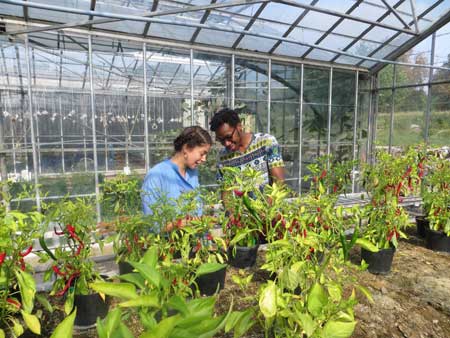
OrganicLea, workers' cooperative
Chingford, since 2001
OrganicLea operates as a workers' cooperative, growing food in the Lea Valley. It ‘began with the idea that more food can and should be grown in London, regenerating the Lea Valley’s food growing heritage’. Their vision is ‘of a socially and environmentally just food system where the means of production and distribution… are controlled not by markets or corporations but by the people themselves’.
They started out with a community allotment site bringing together a few volunteers and now run a 12 acre organic market garden and other community sites where they produce and distribute food and plants locally. They also run a training and volunteering programme for over 300 local residents per year. With a workers’ cooperative at their core, they aim to ‘bring people together to take action towards a more just and sustainable society’.
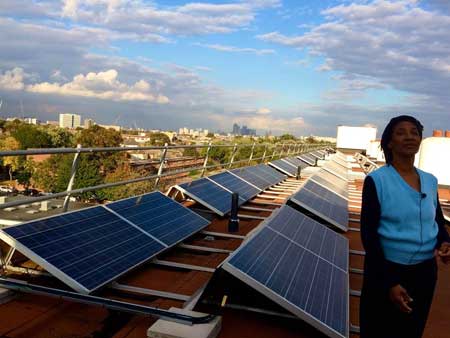
Repowering London, community project
Brixton, since 2012
Repowering London is a not-for-profit organisation that promotes and facilitates the development and local ownership of renewable energy projects across South London. They work with community groups, local authorities and professional installers to develop and build community-funded solar energy projects with the aim of reducing CO2 emissions, generating income for the local community, and increasing community resilience. They also run initiatives to advise people on changes they can make to reduce their energy bills. Repowering London has just launched a new project called Energy Garden. It is ‘the world’s first citywide combined community energy and gardening project. By engaging with local communities, landowners and businesses, the project aims to create a network of interconnected community Energy Gardens at London’s Overground rail stations’.
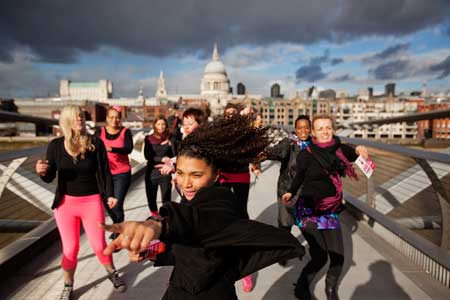
Safer London, charity
Southwark, since 2004
Safer London is a London-based charity working to prevent and address gangs, violence, vulnerability and sexual exploitation. Safer London’s mission is to improve the safety and wellbeing of young people in London affected by violence and crime. They believe that ‘every young person should be given the opportunity to live free from exposure to gangs, exploitation and crime’ and ‘work tirelessly to make that happen’.
One of their newer programmes is ‘London Gang Exit’, in which they are leading a consortium operating across London to provide tailored support to young people aged 16-24 who are involved in or at risk from gangs. They have also recently received funding from the Home Office to pilot a project working with girls aged 11-18 with the aim to help them avoid ‘being drawn into a destructive lifestyle by intervening at an early age’.
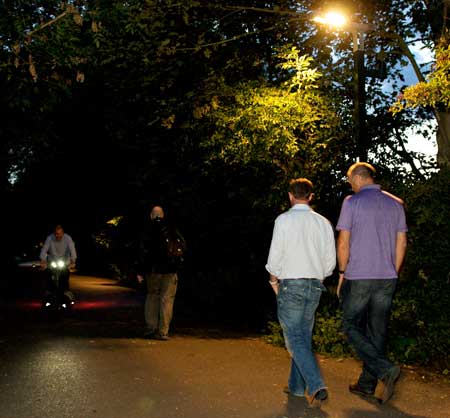
Philips and Thames Landscape Strategy, government-business partnership
Richmond, since 2009
The Warren Footpath has an ‘intelligent lighting solution’ which was developed with both residents and the local bat population in mind. Philips Intelligent Street Lighting for the Natural Environment in partnership with the Thames Landscape Strategy created a lighting scheme for the Warren Footpath in Richmond upon Thames which set out to ‘deliver bright white LED light ensuring residents feel safe and secure when using the footpath, whilst at the same time not flooding the area with too much light and disturbing the nocturnal cycle of the wildlife living in the area – ensuring that wildlife can co-exist in urban areas with local communities’.
The scheme was based on the use of LumiMotion ‘intelligent lighting’ which is programmable and uses sensors to control the lighting through the detection of pedestrian movement. Further benefits are reductions in light spill, wasted light and energy costs.
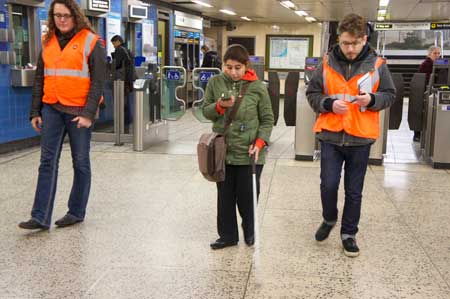
Wayfindr, not-for-profit organisation
Pimlico, 2015
Wayfindr is a publicly available Open Standard software which allows developers to create safe journeys for blind and partially sighted people. Wayfindr is a non-profit organisation whose mission is ‘to empower vision impaired people to overcome isolation through audio based navigation’ by ‘creating a benchmark in standards for digital wayfinding on mobile devices’. Wayfindr is a joint venture between The Royal Society for Blind Children and digital production studio ustwo. In 2015, Wayfindr tested a prototype – based on a phone app which interacted with Bluetooth beacons to provide audio guidance to the users – at Euston and Pimlico stations.
During their first trial, held at Pimlico station in early 2015, 25 vision impaired participants were able to navigate their way to the platforms unaided, even when it was their first visit to the station. The Wayfindr Open Standard is aimed at providing tools for other organisations and developers to build and design applications for vision impaired people using smartphones and beacon navigation systems to aid them in navigating a building or a public space.
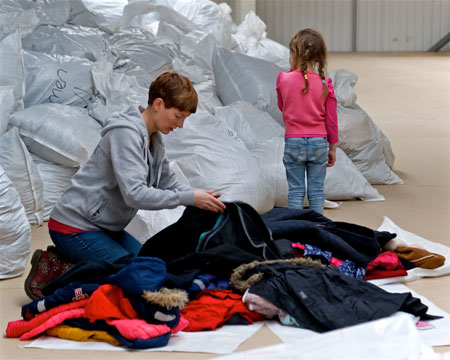
Hands on London, charity
Greater London, since 2010
Wrap Up London is an annual coat donation and distribution campaign that encourages Londoners to donate their unwanted winter coats and jackets to people who need them. The main collections are held at eight major tube stations for three days in the second week of November during the peak morning commute hours. The donations are then sorted and re-distributed directly to homeless shelters and refuges. Wrap Up London is part of Hands on London, a charity that aims to ‘inspire volunteering in innovative, flexible and high-impact ways for busy Londoners unable to give their time on a regular basis’.
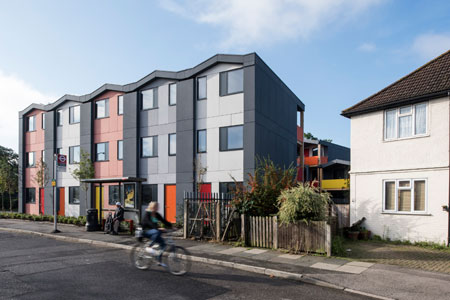
YMCA London South West and Rogers Stirk Harbour + Partners, charity-business partnership
Mitcham, since 2015
Y:Cube is a new housing solution for people unable to afford the high costs of buying or renting in London. YMCA opened its first Y:Cube development in Mitcham in September 2015. Designed by international architectural practice Rogers Stirk Harbour + Partners, Y-Cube units are modular, prefabricated 26m2 one-bedroom studios.
The Mitcham development of 36 apartments was intended for single people in housing need – those leaving hostels and supported housing schemes – with the units rented out at 65% of the market rate in the area. YMCA believe that ‘Y:Cube is a genuinely affordable housing solution to the UK housing crisis’. The units are not only affordable to rent but have the added benefit of lower utility bills.
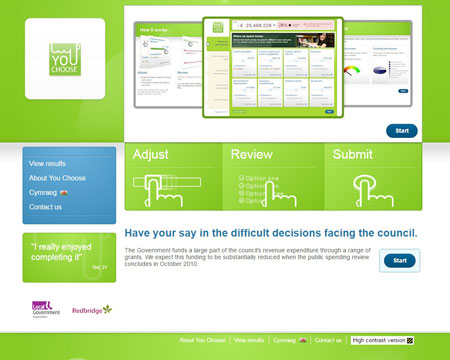
Local Government Association/Borough of Redbridge
Redbridge, since 2010
YouChoose is an online budget simulator that enables local councils to engage members of the public with decision-making about budgets. This online budget simulator was originally developed by the London Borough of Redbridge in 2010 as part of engaging its residents around the decisions the council needed to make to address budget reductions.
In partnership with the Local Government Association, YouChoose has now been made available, free of charge, to other councils, fire and rescue services and authorities in England and Wales. The tool gives citizens the opportunity to understand and voice their opinions on how council resources should be used, and provides councils with information on the perspectives of local people.
The 25 London initiatives were selected by our curator with the help an academic steering group consisting of: Dr Alex Rhys-Taylor, Sociology department at Goldsmiths University; Prof Adriana Allen, Planning Unit at the Bartlett, UCL; and Dr Ayona Datta, Department of Geography at King’s College London.

